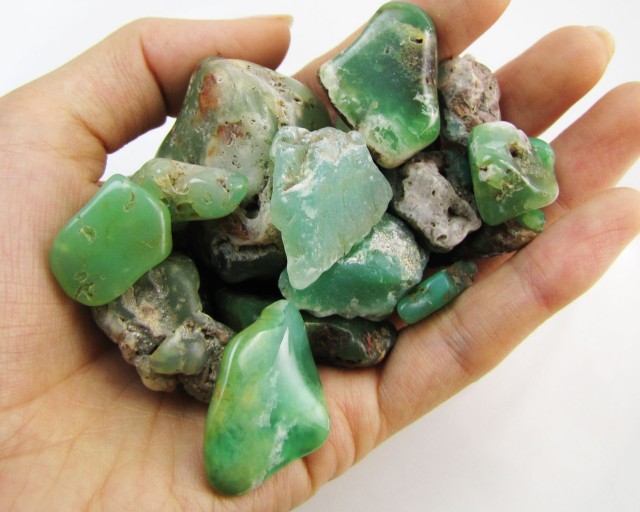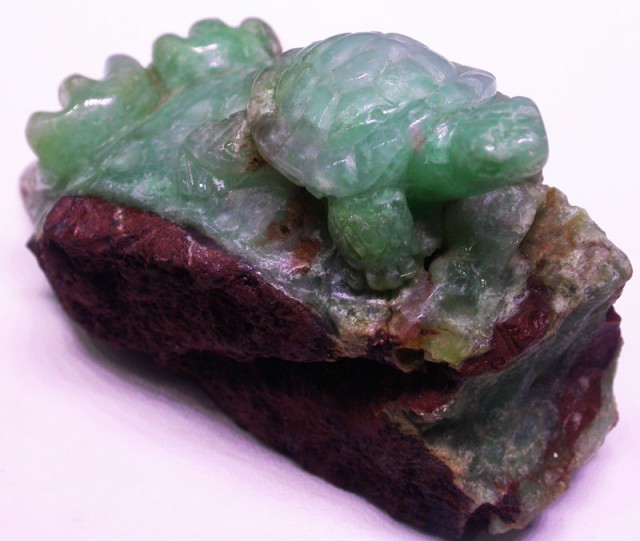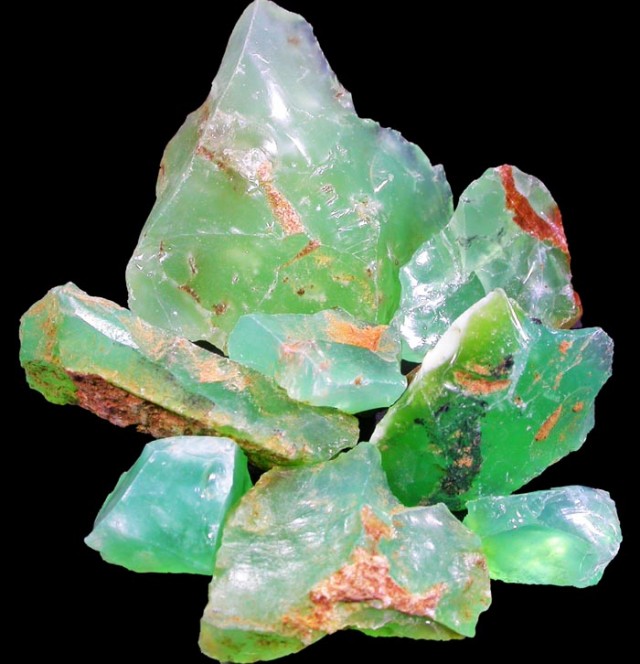
Chrysoprase Gemstone: Meaning, Healing Properties, Uses & More
 Chrysoprase is a variety of chalcedony known for its assorted green hues and resemblance to jade. Beloved for centuries, chrysoprase stone brings optimism and love to anyone who comes across it.
Chrysoprase is a variety of chalcedony known for its assorted green hues and resemblance to jade. Beloved for centuries, chrysoprase stone brings optimism and love to anyone who comes across it.
Chrysoprase was a sacred holy stone to numerous societies throughout history. Though often mistaken for other green gemstones like emerald or jade, chrysoprase held similar reverence.
With its physical beauty and the powerful energy it emits, wearing chrysoprase is sure to draw attention and a compliment or two.
Ready to learn more about the chrysoprase gemstone? Let’s start with the fundamentals.
What is Chrysoprase?
Chrysoprase is a stunning apple-green chalcedony gemstone often called “the stone of spring.” As such, chrysoprase is a May birthstone for those born at the peak of spring.
Spring babies born under Gemini can use chrysoprase as an astrological talisman! As a star stone for Mercury, Gemini’s ruling planet, chrysoprase helps Gemini personalities manage impulsiveness and make confident decisions.
With the historical nickname “Stone of Venus,” it’s no surprise that chrysoprase is a zodiac stone for Libra! Ruled by the planet of love, Libra reflects the Venus traits of charm and grace, which chrysoprase only intensifies.
Speaking of love, chrysoprase commemorates the 18th wedding anniversary! What better way to celebrate 18 years of marriage than with the “Stone of Joy” itself?
Mineral Characteristics
Chrysoprase, or chrysophrase, is a silicate mineral in the chalcedony family, a group of microcrystalline quartz stones. Other microcrystalline stones in this mineral family include carnelian, onyx, and agate.
Chemically, chrysoprase composition includes silica and nickel. Chrome chalcedony shares a similar appearance and composition, but its green hue comes from chromium instead of nickel.
On the Mohs mineral hardness scale, chrysoprase has a 6.5 to 7 ranking, like most quartz stones. As a result, chrysoprase jewelry is durable and long-lasting.
Unlike other quartz stones like tiger’s eye or amethyst, however, chrysoprase contains a small amount of water. The water gives chrysoprase a milky iridescence, where its glow appears within the stone rather than on its surface.
For the rest of the science behind chrysoprase, check out the key features below.
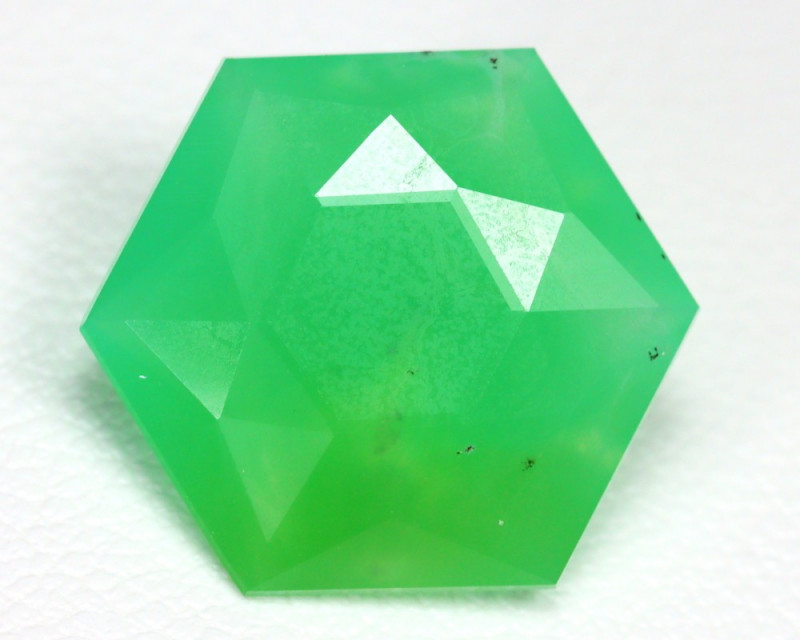
Chrysoprase Specifications and Characteristics
Color: Shades of green, yellow-green, or yellow
Crystal structure: Trigonal (sub-system of hexagonal)
Luster: Vitreous to waxy
Transparency: Semi-transparent to opaque
Refractive index: 1.53-1.55
Density: 2.65-2.91
Cleavage: None
Fracture: Conchoidal or granular
Streak: White
Now, let’s shift into the spiritual to examine chrysoprase metaphysical properties!
Chrysoprase Stone Meaning
The name “chrysoprase” comes from two Greek terms: chrysos, meaning “golden,” and prason, meaning “leek,” after its radiance and green color.
Yellow chrysoprase may go by names like lemon chrysoprase or citron chrysoprase. Lemon chrysoprase meaning ties to self-confidence, safety, and insight.
Green chrysoprase symbolizes joy, wisdom, and new beginnings.
The historical chrysoprase meaning was one of manifesting abundance, balancing the mind, and enhancing spiritual growth.
Medieval Romanian lore claimed chrysoprase gave one understanding of lizard language, based on a local legend. The legend goes that a princess had a golden lizard with chrysoprase eyes. A warlock told her if she kept it, one day she’d communicate with animals and find wealth.
When a famine hit, she tried to feed her people by selling all her jewels besides the lizard. On her last leg, a real lizard with chrysoprase-colored eyes appeared to tell her (in lizard language) to find help at a river.
Indeed, the princess discovered a plethora of chrysoprase in the Râul Doamnei, allowing her to end the famine and begin an era of prosperity.
Elsewhere during the Middle Ages, chrysoprase purportedly faded in color to indicate poisoning. Some believed chrysoprase would grant you freedom if held in the mouth after being accused of a crime.
Ancient Greeks connected chrysoprase to Aphrodite, the goddess of love. They claimed one could manifest greater health and relationships by charging the stone under a half-moon.
Beyond ancient uses, what is chrysoprase good for?
Chrysoprase Healing Properties
There is rich symbolism and electrical energies in healing stones that make them powerful aids. As a green gemstone, chrysoprase helps with mindfulness, emotional balance, and growth. The chrysoprase healing properties vary across physical and emotional benefits.
You can harness these powers, too, by meditating with chrysoprase or creating a crystal grid in your home by placing the crystals in the corners of every room. Even wearing chrysoprase jewelry will bestow positive healing energies toward you all day long.
For targeted crystal healing, what does chrysoprase do?
Physical Healing
Some physical chrysoprase benefits assist with reproductive health. Chrysoprase can increase libido, improve fertility, and give reproductive organs a boost. Plus, lemon chrysoprase purportedly eases menstrual cramps.
Many of us know the frustration of period symptoms, but we all know the frustration of waiting for our body to heal. Chrysoprase can speed up the healing process and soothe throbbing pain, especially when placed nearby while you sleep.
Emotional Healing
Struggling to see the bright side? Chrysoprase crystal promotes a positive, hopeful outlook. By clarifying where you hold yourself back, chrysoprase can help you accept your emotions and take back control of your own wellbeing.
If you’re an empath and get worn out by others’ feelings, chrysoprase can ease your mind and help you establish boundaries. With a clearer head, you can use this “Stone of Thought” to sharpen focus on your goals and pursue what gratifies you.
Chakra Healing
Chakras are energy centers located along the spine of the body. These highly emitting vibrational circuits must all flow freely, but sometimes stagnant or negative energy can accumulate in specific areas, creating a blockage that manifests in unfavorable ways. Not to worry! Gemstones and healing crystals contain vibrational energies that break up blockages, helping you heal and feel good.
For targeted chakra healing, chrysoprase properties can activate the heart chakra, the center of love, compassion, and healing. When the heart chakra is blocked, you may drown in self-pity, isolation, and paranoia.
By using chrysoprase to balance the heart chakra, you can rediscover your self-worth and open your heart to love.
If that sounds good, you’re probably ready to snatch up a chrysoprase stone of your own! But before you do, check out our buying tips below.
Chrysoprase Gemstone Properties
Before you purchase a gemstone, it’s best to know what factors into its value. Color, clarity, and cut are the key traits for estimating chrysoprase value.
Color
Chrysoprase greens vary in shade, from sea glass to deep emerald green. Some specimens exhibit yellow-green hues, like lemon chrysoprase. The green color comes from nickel oxide inclusions, while yellow coloring typically occurs with magnesium inclusions. Chrysoprase in deeper, saturated greens holds greater value than pale or unsaturated greens.
Clarity & Luster
Gemologists give stones clarity grades based on the number of visible inclusions. Transparent colored gemstones have a category grading system, but chrysoprase isn’t fully transparent. Non-transparent stones receive grades of Translucent or Opaque, and chrysoprase falls under Translucent. Regarding luster, the most valued high-quality chrysoprase is semi-transparent.
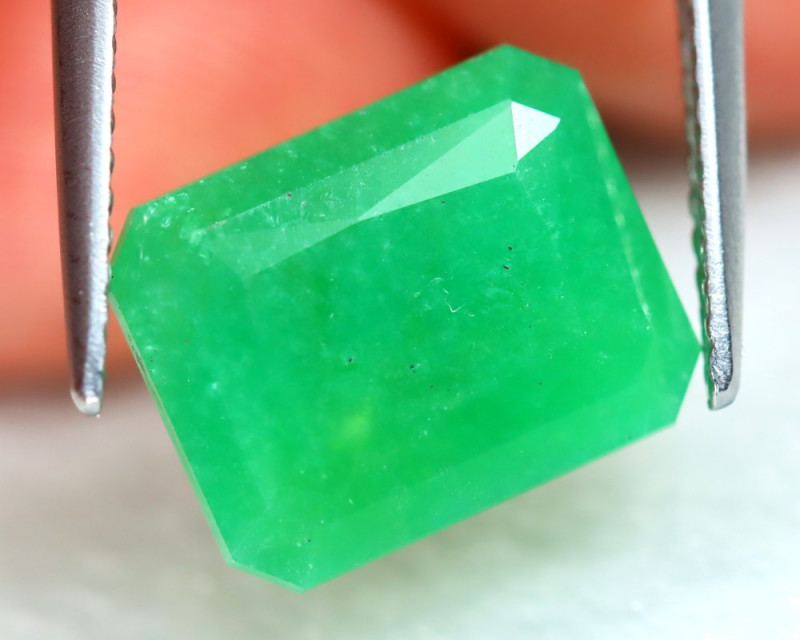
Treatments
Almost all genuine chrysoprase in the market is untreated, thanks to the gemstone’s natural mineral compounds that create striking green hues. If you see something advertised as treated chrysoprase, beware that the stone may actually be dyed green agate that’s mislabeled and falsely advertised.
Cut
The most popular faceted cuts for chrysoprase are briolette and trillions. However, most chrysoprase is cut into beads, cabochons, or tumbled stones. Chrysoprase durability lends well to various carving techniques. Chrysoprase carvings include cameos, intaglios, and figurines. One of the largest historical chrysoprase carvings was a 2nd-century cameo of the Greek god Jupiter.
On that note, let’s dig deeper into chrysoprase’s history!
Chrysoprase History
Chrysoprase uses date back at least 3,500 years, making it one of the oldest semi-precious gemstones known to mankind. Numerous cultures have utilized chrysoprase’s beauty, creating ornate decor, jewelry, and art.
Archeologists uncovered an ancient Egyptian chrysoprase necklace of beads dated to 1500 BC. Ancient Greek and Roman archeological sites contained chrysoprase figurines, seals, and cameos as well.
According to Greek legend, undefeated warrior Alexander the Great always wore a chrysoprase belt to battle. One day, he removed his belt to bathe, and a snake bit off the stone, tossing it in the river. From then on, Alexander was never victorious again. Pretty severe consequence if you ask us!
Later on, in the 1st century, archbishops claimed chrysoprase reflected the work of martyrs. By the 10th century, Christians believed chrysoprase symbolized Christ’s death and afterlife kingdom.
What is chrysoprase in the Bible? Judaism and Christianity refer to a utopian afterlife society called New Jerusalem in sacred texts.
Jewish scripture describes a prophetic vision of the city that includes twelve gemstones as the city’s foundation, as twelve symbolized completion. Chrysoprase was the tenth stone, between topaz and jacinth.
Closer to modern times, chrysoprase’s popularity skyrocketed around Europe in the 1700s after rich deposits in Poland were discovered. Nobles like Frederick the Great of Prussia and Queen Anne of Great Britain adorned palaces and tiaras with chrysoprase.
The 1920s saw King Tut’s tomb unearthed and Egyptian-inspired jewelry flourished as part of the Art Nouveau period. Chrysoprase looked similar to Tut’s Egyptian treasures, so revival jewelry incorporated the stone frequently.
Speaking of digging up treasures, how does chrysoprase form before it’s unearthed?
Chrysoprase Origins and Sources
Chrysoprase forms within nickel-rich rocks. Mineral-rich water solutions settle into crevices within the rocks and gradually cool, crystallizing into chrysoprase. If deposits contain other minerals like iron oxides, chrysoprase may appear as a black and green stone.
Over time, chrysoprase specimens became rarer. Modern chrysoprase deposits are small, typically filling crevices between a few inches to a few feet.
Where are the modern locations for finding chrysoprase?

Mining Locations
Nowadays, most chrysoprase comes from Australia and Tanzania, with Australia accounting for roughly 85% of all chrysoprase produced.
A common misnomer for chrysoprase is “Australian jade,” as some Australian specimens are high-quality enough to pass for jadeite. As such, Australian chrysoprase has a huge market in jade-loving China.
Where is chrysoprase found in Australia?
The major chrysoprase fields in Australia include Western Australia deserts, Queensland, and Marlborough. Marlborough’s variety called Candala Chrysoprase is the highest-quality chrysoprase mined in Australia.
Unfortunately, extreme weather means Australian chrysoprase mining is sporadic and costly, making their chrysoprase mining process quite expensive.
Where else can you find chrysoprase?
Brazil
Germany
India
Indonesia
Poland
Madagascar
Russia
South Africa
United States (Arizona, California, and Oregon)
Tanzania
Since many mines are costly to run, how does that affect chrysoprase price?
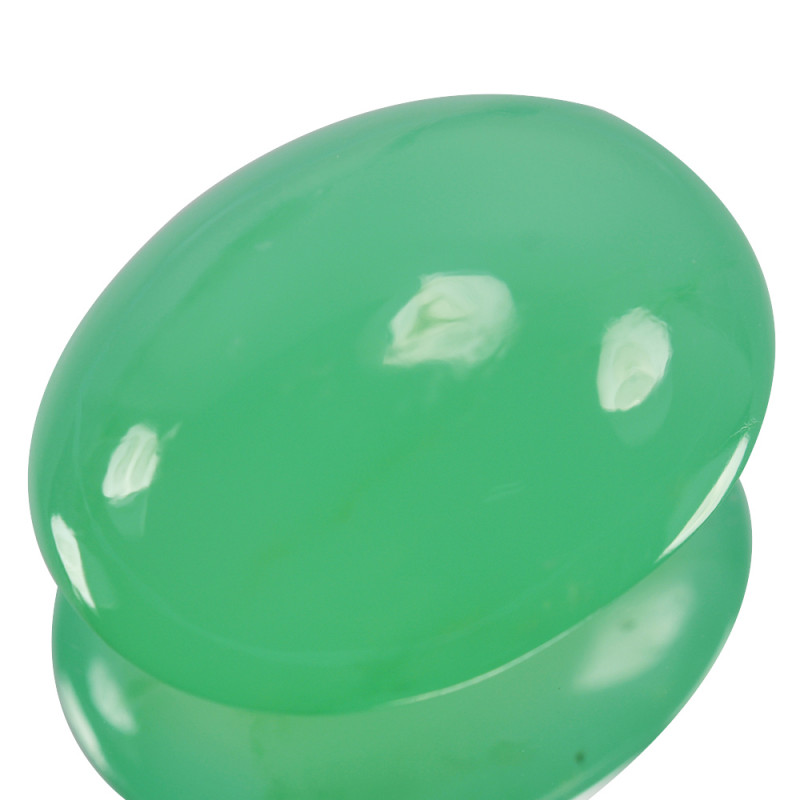
Chrysoprase Stone Price and Value
Chrysoprase mines used to be far more abundant than they are now. Poland once boasted the largest chrysoprase mine in the world but depleted its supply by the 14th century.
Among chalcedony stones, chrysoprase is the second most valuable, only topped by blue chalcedony. Vibrant, apple-green chrysoprase with semi-transparent luster will command the highest prices.
High-quality chrysoprase gemstones range from $2-$12 per carat at wholesale prices. Depending on where it was sourced, chrysoprase gemstone prices may increase to $20-$40 per carat.
Chrysoprase raw is more affordable, between $0.10-$5 per carat, with most specimens on the lower end of that spectrum. Most chrysoprase cabochons range from $0.50-$2 per carat, with some semi-transparent around $10 per carat.
After your purchase, how do you make chrysoprase last?
Chrysoprase Care and Maintenance
Because chrysoprase has a small amount of water, dehydration can damage the stone. To prevent chrysoprase dehydration, avoid prolonged exposure to direct sunlight, dry heat, and intense light sources.
Store chrysoprase in a dark, slightly humid environment if possible. If not, you can keep the gem in a fabric bag separate from other gems.
When cleaning chrysoprase, warm, soapy water, and a soft brush or cloth will do the trick.
Craving a Slice of Chrysoprase?
That covers all the details about chrysoprase you should know! For a gemstone with such rich history, symbolism, and spiritual properties, chrysoprase has earned its spot as a legendary gem. Whether you’re looking for a more balanced life, a fresh start, or a new accessory staple, chrysoprase won’t disappoint!
Search the Gemstone Encyclopedia
Related Auctions
Related Articles
Originally the Birthstones or gemstones were associated with a zodiac sign or the month of a individuals birth. Find out what your stone is and view the stones we have for sale
8th Feb 2021
There are dozens of quartz and chalcedony gems with various colors and patterns. Learn all about quartz properties and every type of quartz, from amethyst and agate to plasma and phantom quartz!
15th Oct 2020
Hackmanite is a pink to violet sodalite gem known for its unique color-change and luminescence. Learn why hackmanite is special, from its rare qualities to the types of hackmanite jewelry available.
28th Mar 2018
Latest Articles
Shortite is a rare mineral and rarer gemstone, usually found as colorless or yellow wedge-shaped crystals. Learn the value, history, and properties of shortite in this guide!
9th Dec 2024
Senarmontite is an uncommon antimony mineral mostly used industrially but occasionally collected as rare gems or pearly crystals. Find out all of the traits, uses, prices, and history of senarmontite.
27th Nov 2024
Tantalite is a group of red, brown, or black minerals containing the rare and valuable element tantalum. Discover the uses, history, prices, and properties of tantalite gemstones in this guide!
11th Nov 2024
Article Categories
How To's is where you will find helpful articles from gem Rock Auctions on how to cut gemstones, select gemstones and buy gemstones.
9 Articles

